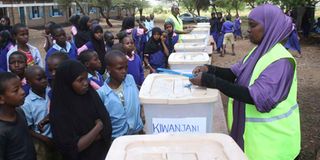Corporal punishment in schools is violation of children’s rights

A teacher at Kiwanjani Primary School in Wabera Ward, Isiolo County, seals ballot boxes after the pupils cast their votes during the learners’ government elections in 2017.
What you need to know:
- Incidents of students burning school property and assaulting teachers have escalated.
- These occurrences have left teachers and school administrators feeling helpless.
Recent reports of student indiscipline and unrest have left Kenyans wondering what is going on in the lives of the children. Incidents of students burning school property and assaulting teachers have escalated. Parents of a student who was expelled from school for gross misconduct sued the school for readmission.
These occurrences have left teachers and school administrators feeling helpless and elicited a debate on whether the 2001 abolition of corporal punishment in schools is to blame. Some parents and teachers have even called for its reintroduction.
The Cabinet Secretary for Education, Prof George Magoha, weighed in on the debate, mulling over the return of the cane and adding that the police should book the destructive students.
These conversations touch on the rights of children. Applying a human rights-based approach in all its interventions holds that corporal punishment in schools violate both Kenyan law and international standards. The Constitution, at Article 29, outlaws torture, corporal punishment as well as any other cruel, inhuman and degrading treatment.
In addition, Sections 13 and 18 of Children Act provides that a child shall be entitled to protection from physical and humiliating abuse by any person and shall not be subjected to torture, cruel treatment or punishment.
Extreme punishment
At the same time, numerous international and regional human rights institutions have declared that some or all forms of corporal punishment in school violate the human rights of children.
The United Nations Committee on the Rights of the Child, the UN Special Rapporteur on Torture and the European Court of Human Rights have all spoken out against corporal punishment generally, viewing it to be a form of cruel, inhuman or degrading treatment. Many nations have either severely restricted corporal punishment or banned it.
As a signatory to the UN Charter on Human Rights, and in keeping with the international trends on the rights of the child, Kenya banned corporal punishment in schools.
The style and shape that corporal punishment has taken in the country is, sometimes, extreme, where a child suffers not only physical but also psychological injuries. In few cases, disability and even death has resulted, mainly for lack of its standardisation.
It’s better to err on the side of caution and keep corporal punishment outlawed, replacing it with other modes. Firstly, it is a form of child abuse that occasions physical pain and suffering. Psychologically, it makes children scared, intimidated or threatened.
Disciplinary measures
Secondly, corporal punishment breeds a culture of violence as it sends out the message that violence is socially acceptable — an entirely wrong message to be giving out to children. Thirdly, there is no evidence that corporal punishment yields the highest attainable level of discipline or any at all.
Fourthly, it is administered unfairly as there is no way of regulating or controlling the force and approach used, in some cases resulting in death. Fifthly, its ‘positive’ effects do not last; they are short-lived. Sixthly, it generates a cycle of abuse; victims take up the violence and begin to abuse or physically inflict pain on their friends and/or siblings. They may grow up to be physically abusive parents, spouses and employers.
In sum, corporal punishment violates human dignity. Some forms of it amount to torture, yielding devastating effects on their psychological, emotional and psychosocial development. It should not be reinstated.
In dealing with student indiscipline and unrest, we recommend, firstly, positive reinforcement of good behaviour. Secondly, initiate proper guidance and counselling, making children aware that bad choices have negative consequences.
That means parents should lay a strong foundation of and foster good behaviour among their children. Finally, encourage non-physical disciplinary measures as an alternative to beatings.
Dr Oloo is the CEO of EACHRights; [email protected].
Ms Wawira is the project manager, Education Support Project, at EACHRights; [email protected].





